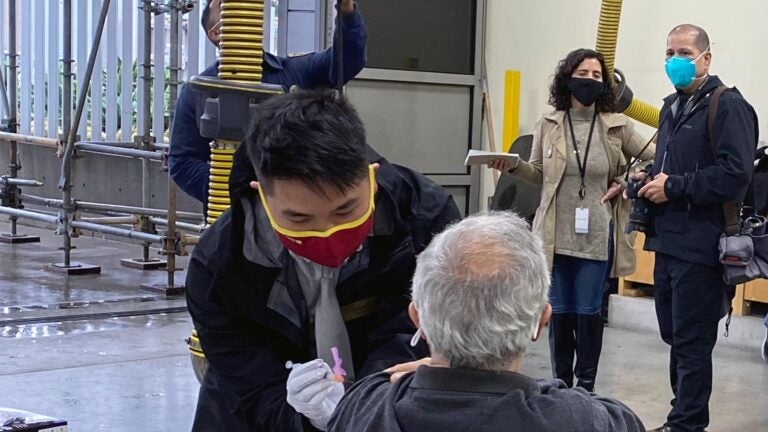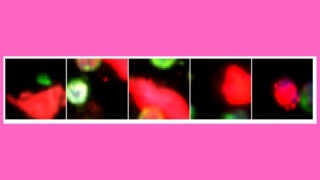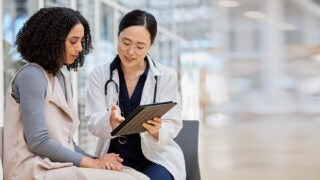
USC School of Pharmacy student Trevor Lee administers a COVID-19 vaccination at Lincoln Park. (Photo/Courtesy of Trevor Lee)
When COVID-19 vaccinations began, the USC community sprang into action
From day one of distribution to today, Trojans have been delivering vaccines to hard-hit communities, volunteering at mega-sites and ensuring that hundreds of thousands of shots get into arms.
The numbers tell the story: Since Pfizer received emergency approval for its COVID-19 vaccine in mid-December, quick efforts by USC have contributed to more than 800,000 people in Los Angeles getting inoculated.
“This moment calls for teamwork, and everyone is coming together to play their part,” said Vassilios Papadopoulos, dean of the USC School of Pharmacy. “Pharmacists and other front-line health care workers, first responders, local and state government, universities, nonprofit organizations and corporations — there is a true sense of collaboration.” And the results are resounding.
USC hits the ground running with COVID vaccinations
The announcement came on Dec. 11, 2020: The Pfizer-BioNTech COVID-19 vaccine had received emergency approval from the FDA. Approval for Moderna’s vaccine soon followed. California quickly solidified its plans for vaccine distribution, and local partners in each county were identified. USC was one of three partners that would be leading efforts in Los Angeles County. First in line for immunization were the health care workers who had been risking their lives caring for COVID patients every day.
On Dec. 17, 2,500 doses of the Pfizer coronavirus vaccine arrived at Keck Medical Center of USC and at USC Verdugo Hills Hospital. Health care workers, including USC Student Health staff members, were the first to get vaccinated.

But it was no time to celebrate. While launching the vaccine efforts, the front-line employees were also battling a rise in COVID cases that was flooding hospitals with patients. The pandemic was stretching resources, but USC’s commitment would not be waylaid.
Once the majority of health care workers had received their shots, the focus turned to the community and USC continued to be on the forefront in taking care of communities all over Los Angeles. Teams from the USC School of Pharmacy, Keck Medicine of USC and the Keck School of Medicine of USC took the lead in rolling out a huge COVID-19 vaccination effort for health care workers and patients over 65.
Pharmacy school volunteers assist with community efforts
Leading the charge for the county vaccination endeavors were USC pharmacy school students, who were active and eager volunteers at two COVID-19 vaccination sites. They led the Lincoln Park vaccination distribution center and participated at Dodger Stadium, the largest mega-distribution site in the United States.

Doctor of Pharmacy student Benny Wu explained why he participated: “This pandemic has taught me that there is always someone who needs help. Sometimes you have to ask for help, and that is perfectly normal. Other times, you have to step up and be the one to help others.”
Expanding vaccine access in the hardest-hit neighborhoods
In partnership with L.A. County, the mayor’s office, L.A. Fire Department, the nonprofit Community Organized Relief Effort and other groups, COVID-19 inoculations were delivered in some of L.A.’s hardest-hit neighborhoods, where Black and Latino families have borne the brunt of the pandemic and test positivity rates have ranged from 23% to 31%.
“From the start, we have been committed to making vaccine distribution fair and equitable,” said Felipe Osorno, executive administrator of continuum of care operations and value improvement at Keck Medicine. “Latino and Black residents are disproportionately dying from the disease while getting vaccinated at a lower rate, and we will continue to address these disparities through educational outreach on the safety and efficacy of the vaccine and by reducing barriers to receiving it.”
Peter Marshall, a pulmonary critical care specialist, had his vaccination journey shared in a story posted on Keck Medicine’s YouTube channel. He explained why he got the vaccine and why he believed it was so critical for people of color to get their vaccine:
“Communities of color have a historical mistrust of the health care system that in large part is justified. However, at some point mistrust has to give way when it denies people of color access to safe and effective health care … and people of color should not miss this opportunity to protect themselves and their community.”
As state and county health departments continued to develop protocols to distribute the COVID vaccine equitably and responsibly, Keck Medicine opened its vaccine clinic to people ages 16 to 64 who work in health care, education and child care, emergency services, and food and agriculture, dedicating several days of vaccine clinic appointments.
After hearing about the challenges many Holocaust survivors were facing, USC Shoah Foundation reached out to its partners on campus and in the community to find a solution to simplify the vaccination registration process.
On the heels of the health system opening up vaccine appointments to the 65-and-older family members of USC environmental services employees, cafeteria workers, valet drivers and materials management workers, the older relatives of front-line health care workers had the opportunity to go to the Health Sciences Campus and USC Verdugo Hills Hospital to receive their first dose.
USC brings COVID-19 vaccination efforts back home
In early March, efforts pivoted again to expand the vaccination program to employees and staff. The USC Student Health team has administered nearly 9,500 vaccines, with 2,100 staff and faculty receiving both doses.
Employees at Keck Hospital and across the USC campus have rallied to encourage colleagues to get their shots. The effort, “Vaccine Heroes,” showcased why the vaccine was important and how easy it was to get the shot.
“We can be proud of our Trojans for bringing the best of themselves forward during this pandemic, especially in this crucial time when we are so close to ending the pandemic,” said Sarah Van Orman, chief health officer at USC Student Health.
“The vaccine effort — from the teams organizing and administering doses to the many heroes who are ambassadors on the benefits of immunization — is going to make a difference in protecting communities across California and staving off further spread of COVID-19 variants.”



